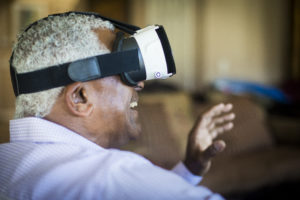How can virtual reality help with early diagnosis of Alzheimer’s disease?
Alzheimer’s disease is the most common cause of dementia in the UK and the symptoms develop gradually over many years.
Background
The symptoms of Alzheimer’s disease can progress slowly and many, such as getting more forgetful, can be attributed to ‘just getting older.’ This can make diagnosis more difficult and currently there is no single test that can be used to diagnose Alzheimer’s disease.
Aim of the study
Researchers from University College London (UCL) are looking at whether it is possible to use Virtual Reality (VR) to improve the diagnosis of early Alzheimer’s disease, before people develop dementia, by looking at a part of the brain called the entorhinal cortex, which lies in the temporal lobe, which shows early damage in the disease. The study team is hopeful the results will benefit the detection of Alzheimer’s disease in its earliest stages.
What do participants have to do if they choose to take part?
To take part, participants will be asked to travel to test sites in London and West Sussex and be asked to do two tasks.
The first part of the study will involve wearing a VR headset and completing a memory task inside the virtual environment. Participants will experience being in a virtual outdoor space with a circular table in the middle with a dome on top. The dome will lift up revealing a table of objects. They must memorise where the objects are before seeing the objects again for a second time and trying to detect which one has moved. Before the second viewing, the table may rotate or they may have to move.
The researchers will record two things during the VR task; how well participants perform (i.e. did they correctly identify which object moved?) and also the eye movements when looking at the objects.
The second part will involve doing traditional “pen and paper” tests of memory and thinking. The research team will evaluate how well the VR task compares to more of these traditional tests to see if the former has an enhanced ability to detect early Alzheimer’s disease.
Chief Investigator Dr Dennis Chan says,
“Our hope is that these novel VR tests can help us diagnose better early Alzheimer’s disease. Earlier diagnosis would then allow earlier use of treatments which may in the future delay the progression to dementia.
“For participants, it offers an opportunity to get involved in something a little bit different, and to play a part in testing a potentially more effective diagnostic tool.”
Who can take part?
The ENtorhinal COrtex function in early Alzheimer’s Disease: ENCOAD study is open to healthy volunteers and to people with mild cognitive impairment, over the age of 30.
Participants may not be able to take part in ENCOAD if they have other conditions that might affect their memory or their ability to use the VR.
The study is open until October 2026.
Travel expenses will be reimbursed and participants will be paid for their time.
To find out if you are eligible to join this study, as well as other dementia studies, sign in to your Join Dementia Research account or if you are not already registered, sign up today.

